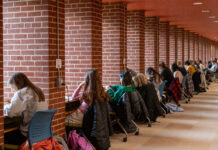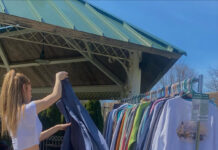Slippery Rock University’s Theatre Department experienced positive reviews, life-changing opportunities, and a special guest while performing Electra: An American Gothic this summer at Scotland’s Festival Fringe.
Sixteen students and three faculty members involved with the original production traveled to Scotland from July 27 through Aug. 10 to participate in the world’s largest arts festival – The Fringe.
“Every student that has gone on this trip starts to measure their life in ‘Before Scotland’ and ‘After Scotland,’” Dr. David Skeele, SRU professor of theatre and playwright of Electra, said.
Skeele, who did not travel with his students this year, said he enjoyed seeing what the students discovered while at the festival and how they have adapted their roles to the atmosphere.
“It’s amazing because they get to perform at an international, professional level but also get to see other performances,” SRU associate professor of theatre, department chair, and the play’s director, Gordon Phetteplace, said when asked to describe the feeling of having his students participate in the festival.
Some students saw over forty shows during the twelve- day trip, Phetteplace said, most of which were performed by established, older actors.
Did that make them nervous?
“We started seeing all these performers and we were like ‘Okay, we’re going to step up our game even more.’ And our show kept evolving and people were finding new things and doing new things,” senior communications and theatre major Carina Iannarelli, 21, and the actress who played Electra said.
“We wanted to show everybody what we could do and that just because we are from a university, we weren’t going to be babies about our performance level,” she said.
British actor Julian Sands, who has appeared in numerous films including, “The Girl with the Dragon Tattoo” and “Warlock,” enjoyed watching their production so much that he left a letter to the cast praising their performance, Skeele said.
That praise did not come easy.
Festival goers were surrounded by thousands of shows and artists to choose from, so it was not uncommon for the cast to wake up at 3 a.m. to be the first to hang posters along the streets or hand out business cards in order to attract an audience to each of their eight performances, Iannarelli said.
“All of our materials went over as ten bags of checked luggage,” Phetteplace said, “two of which were strictly public relations materials such as posters, flyers, and business cards.”
Other challenges included packing a foldable set intended to resemble a house and southern belle-like skirts into luggage bags, time restraints, and stage space.
The cast had approximately an hour and a half to set up, perform, and tear down their act each night, Phetteplace said.
As far as the stage itself, which was located in the basement of a church, “it was very intimate,” Iannarelli said.
“Every second you were reminded there was an audience. You would take one step to the right and there was an audience. One step to the left and there was more audience,” she recalled.
Prior to the festival, Phetteplace had alluded to the idea of Skeele writing two additional plays to accompany Electra in the tradition of Greek trilogies. Ideally, the theatre department would perform the shows over a succession of three nights.
“It’s possible,” Skeele replied, “but I might go in a different direction for the next festival.”
The department’s upcoming performances will include “Scab” and “A Christmas Carol.”
The Edinburgh Festival Fringe is the largest arts festival in the world and has been held every August since 1947. The festival serves as a platform for thousands of shows, artists, and interested spectators.







